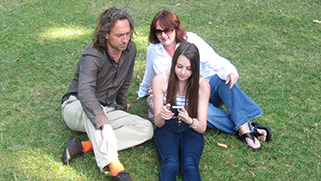For the parent, as for the child, a Type 1 diabetes diagnosis is likely to come as a huge and often sudden shock. One moment your child or teenager is well, then suddenly they have an unquenchable thirst and run to the loo every few minutes. Or your baby drenches their nappies. Then, just as suddenly, they become alarmingly ill.

You hurry them to the doctor. By now you’re really worried: Is it some infection? What’s going on? And when your GP either calls an ambulance or tells you to go to A&E immediately, normal life as you know it suddenly changes forever. Events now move so quickly that you barely have time to think. But, then you’re given a diagnosis: “It’s diabetes”.
"It's diabetes"
It’s a huge shock to learn that your child has a medical condition. And diabetes? Most people have no idea what ‘diabetes’, in all its complexity, means.
At the same time, you’re trying to stay calm, and comfort your distressed and frightened child, whatever their age. It’s also upsetting for you to hear your child say things like: “I don’t want any more needles”, or even: “Am I going to die?”.
Coming to terms with your child’s diabetes diagnosis
A diagnosis of diabetes can bring with it a great sense of loss. Allow yourself to go slowly through the process of mourning, which involves acknowledging grief, anger, fear. Don’t be tempted to overlook or hurry this mourning process, even if you think you should be positive and calm for the sake of your child. Ignore well-meaning people who tell you: “Be positive! There’s no other choice!”. After all, ‘being positive’ can be hard and isn’t something you can choose to do as and when you please.
There’s no easy way to deal with this situation. Use your own knowledge of your child and the relationship between you – and common sense. Even if you don’t know much about diabetes yet, you do know your own child.
It may help to separate the physical, practical and immediate demands of managing diabetes from the emotional acceptance of the condition, which is likely to take much longer to come to terms with. You also need to recognise that although both you and your child are grieving, you’re both feeling different things and expressing your grief in different ways.
As a parent, you need to be able to allow and manage your child’s confusion and distress. This doesn’t mean taking a deep breath, ignoring all your difficult emotions, acting calm and pretending to cope. It does mean getting proper adult support for yourself. If you do get support, you’ll find it easier to allow your child the time and freedom to come to terms with their new way of life.
Diabetes support for parents
If you’re lucky, you’ll have support from your family and friends. If you’re not so lucky, you still have the support of your Paediatric Diabetes Specialist Nurse (PDSN) and diabetes team – and Diabetes UK. If you’d like to talk to other parents, your PDSN may be able to help; or you may want to attend aDiabetes UK Care Event, which run throughout the year, across the UK, and are aimed at children, young people, adults (18–30) and families living with diabetes.
For help and support, callDiabetes UK Carelineon 0345 123 2399 (Monday–Friday, 9am–7pm).
